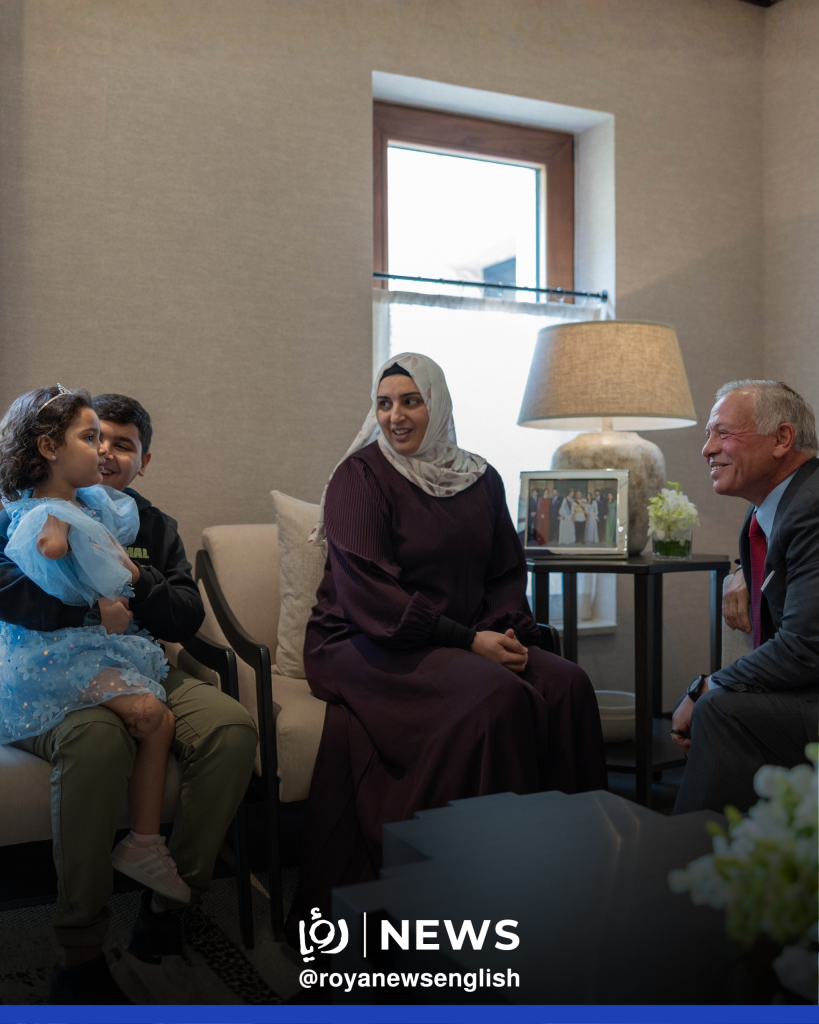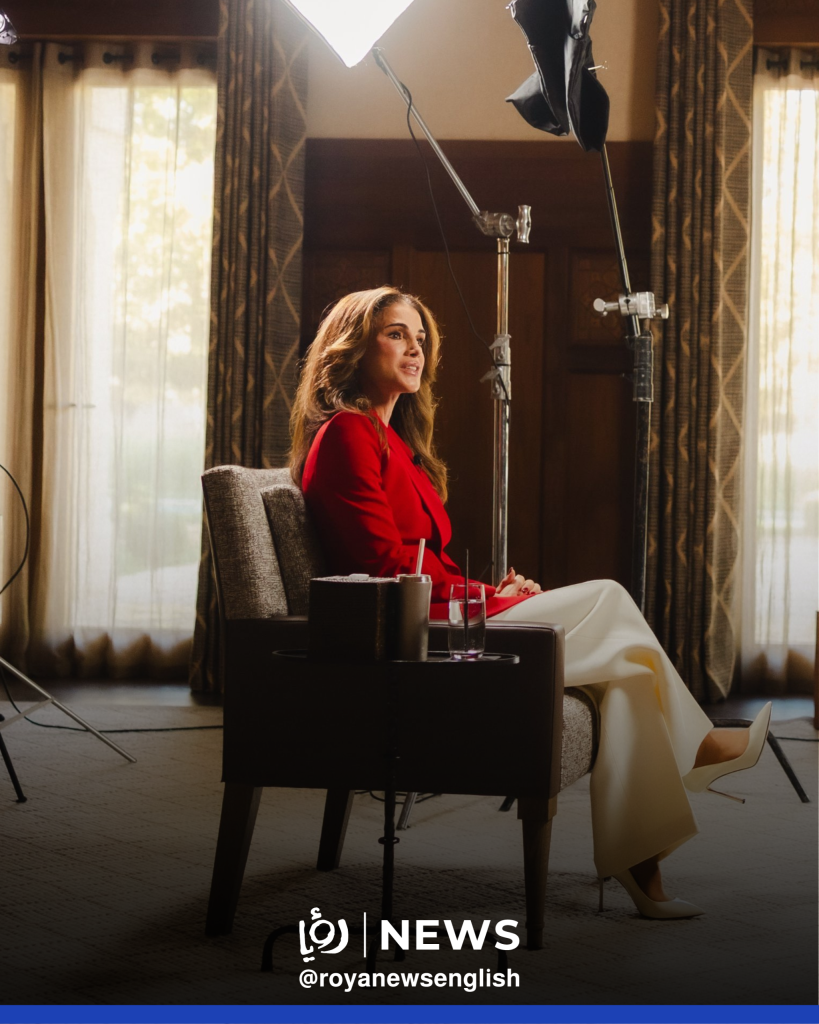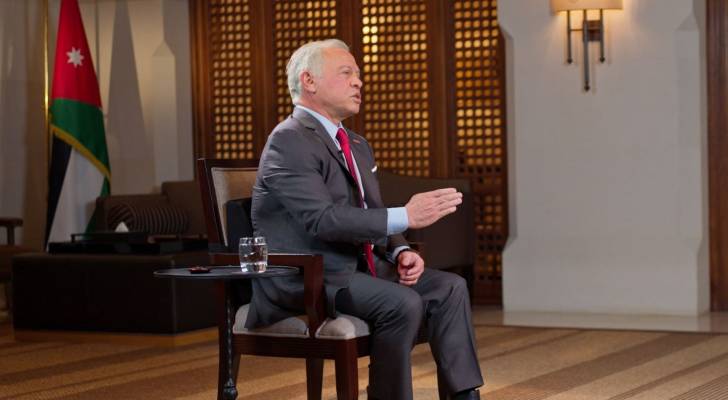King Abdullah II during a BBC documentary titled: “The King of Jordan and the Children of Gaza.”
“It is a genocide as far as I’m concerned", says King Abdullah II on Gaza in BBC documentary
Note: AI technology was used to generate this article’s audio.
On Monday evening, the BBC aired two interviews with Their Majesties King Abdullah II and Queen Rania Al Abdullah as part of a documentary titled “The King of Jordan and the Children of Gaza”, which highlights Jordan’s humanitarian efforts to aid Palestinians in Gaza.
In the interview, conducted by BBC Special Correspondent Fergal Keane for the program Panorama, His Majesty spoke about the suffering of Gazans, saying: “Honestly, as an ex-soldier, I never thought—and again, the stories that I get from my field hospitals, and they are countless—that a government could inflict such suffering on a people.”
The King commented on the destruction inflicted on the Strip that he witnessed during his participation in a number of airdrops carried out by Jordan to send aid, saying: “Looking over the devastation of that part of Gaza was just a shock to me.”

Commenting on the Jordan-led airdrops, His Majesty added, “And I also did it because I was then going to talk to people in the West to say that I’ve looked over the back ramp of an aircraft, I’ve seen it myself, and how we as the international community are allowing this to happen is mind-boggling.”
Describing what happened in Gaza, the King said: “It is a genocide as far as I’m concerned. The international community, many countries believe it is.”
His Majesty continued: “There are movements in the international courts that call it genocide. In this day and age, after lessons that [humanity] has learnt in our recent history, that this is allowed to happen is, again, beyond the pale.”
Commenting on the outbreak of war in Gaza in October 2023, the King said: “Everybody was shocked and surprised. And we realized that this was going to be of such magnitude that the region was going to go through shocks.”
His Majesty further explained: “I told my people, pretty obvious where this was going to go, never thinking that we’d go beyond six months of this.”
The King was asked about the invitation that he and other regional leaders received to attend a meeting in New York last September to hear the details of United States President Donald Trump’s peace plan. His Majesty said: “The message he gave all of us was that ‘this has to stop. It has to stop now’,” referring to the war on Gaza.
The King added: “As he outlined the plan, most of us were surprised because a lot of it was—actually, I would say 85 per cent of the plan was very similar to what we and the Europeans have been talking about. And we said, ‘You know, Mr. President, if anybody can do it, it’s you’.”
In response to a question about whether he shares President Trump’s belief that peace, achieved through the US plan to end the war in Gaza, can be permanent, His Majesty said: “It has to be. Because if we go through this again, I don’t think that the region will be able to survive. And so, after 80 years of conflict, enough is enough.”
The King responded to a question about whether he would, as part of the peace process in Gaza, send Jordanian security and army personnel to train local security forces, or to provide security in the Strip, saying: “The short answer is no, because we believe that we’re too close to this issue politically. Having said that, and again going back to the details, what is the mandate of security forces inside of Gaza? And we hope that it is peacekeeping, because if it’s peace-enforcing, nobody will want to touch that.”
His Majesty went on to explain: “Peacekeeping is that you’re sitting there supporting the local police force, the Palestinians, which Jordan and Egypt are willing to train in large numbers, but that takes time. If we’re running around Gaza on patrol with weapons, that’s not a situation that any country would like to get involved in.”
The King was asked, “Do you trust Hamas when they say they accept not being part of the political future?” to which he replied: “I don’t know them, but those that are working extremely close to them, Qatar and Egypt, feel very, very optimistic that they will abide by that. If we don’t solve this problem, if we don’t find a future for Israelis and Palestinians, and a relationship between the Arab and Muslim world and Israel, we’re doomed.”
When asked whether the conflict between Israel and the Palestinians could destabilize Jordan, His Majesty said: “My father, I remember towards the end of his life, used to say, ‘I want peace for my children and their children.’ I have two grandchildren; they deserve that peace. How awful would it be for them to grow up to say the same thing that my father said years ago?”
During her interview for the documentary, Her Majesty Queen Rania spoke about the dangerous situation in Gaza, asking: “You know what it’s like to be a parent over the last two years? To watch your children suffering, starving, shaking in terror, and to be powerless to do anything about it, and to know that the whole world is watching and not going to do anything about it? That nightmare, it’s the nightmare of any parent, but that nightmare has been the daily reality for Palestinians for the last two years.”

Speaking about the consequences of the war, Her Majesty added: “You know, it’s not just about numbers, it’s about the means that were used, the dehumanization, the fact that food was used as a weapon of war. The fact that things like medicine and painkillers and anesthesia were not allowed to get into the territories. There’s no excuse for that.”
The Queen commended President Trump’s efforts to achieve a ceasefire in Gaza, saying, “To his credit, Trump was the first president in a long time to actually apply pressure on Israel.”
Her Majesty added: “Beforehand, when they crossed lines, the US president would just maybe say a few words of rebuke, or they just get a slap on the wrist. President Trump actually got Netanyahu to agree to a ceasefire. And I hope that he continues to be engaged in this process because, like I said, this is only the first step.”
The Queen noted that the road to rebuilding Gaza is going to be long and arduous.
In the documentary, journalist Fergal Keane recounts how its idea came about, and the interviews with the King and Queen, after he followed the journey of two Palestinian children, Abdelrahman and Habiba, who were receiving medical treatment in Jordan after being injured during the war on Gaza.
The documentary also follows Habiba’s medical journey, as she undergoes various stages of treatment in Jordan, in addition to meeting His Majesty, along with her mother and brother.
According to medical staff supervising her case, who were interviewed for the BBC documentary, Habiba arrived from Gaza, accompanied by her mother and brother, in critical condition.
The BBC documentary addresses the extent of the destruction inflicted on Gaza and its people, as well as Jordan’s efforts, led by the King, to mobilize the international community to stop the war and strengthen the humanitarian response in the Strip.
The documentary also highlights Jordan’s efforts to send aid by land and air, and the Kingdom’s pledge, which His Majesty noted during a meeting with President Trump in February, to treat 2,000 Gazan children in Jordanian hospitals.




